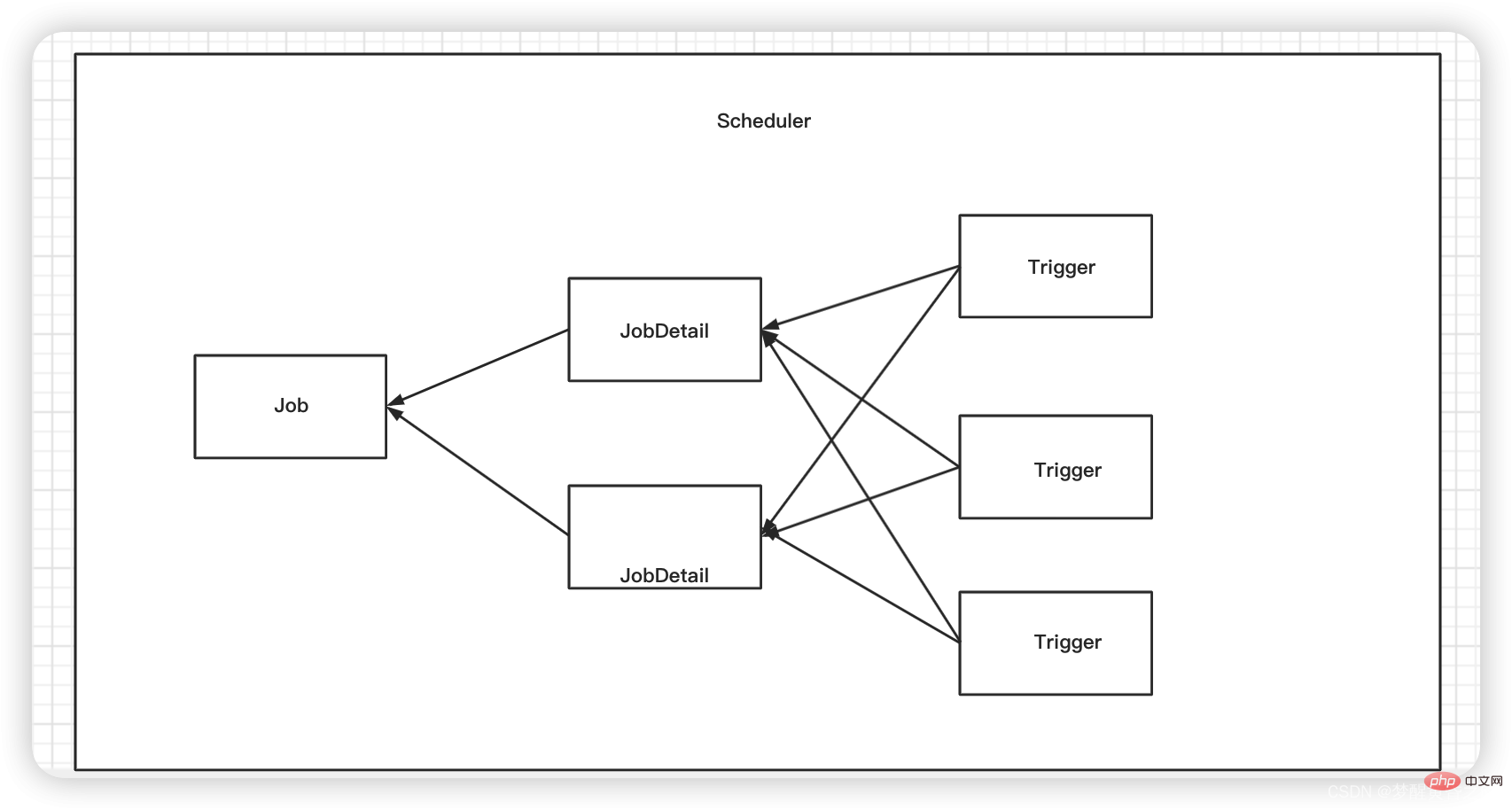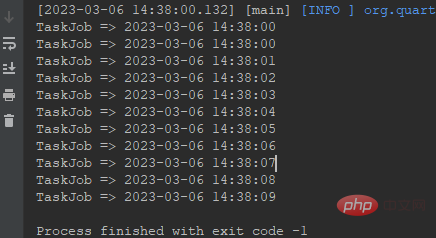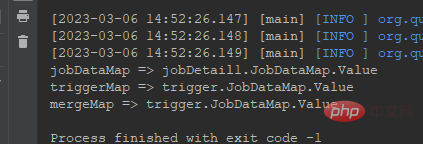How to use Quartz to implement scheduled tasks in Java?
Scheduler will create a new Job instance based on JobDetail every time it is executed, so as to avoid the problem of concurrent access (the instance of jobDetail is also new)
Quzrtz scheduled tasks are executed concurrently by default, no It will wait for the last task to be executed, and it will be executed as long as the interval is up. If the scheduled task is executed for too long, it will occupy resources for a long time and cause other tasks to be blocked.
@DisallowConcurrentExecution: On the job class, concurrent execution is prohibited Multiple instances of the same job definition (defined by JobDetail).

scheduler: It can be understood as a work container or workplace for scheduled tasks. All scheduled tasks are placed in it and can be opened and stop.
trigger: It can be understood as the work rule configuration of a scheduled task. For example, it is called every few minutes, or it is specified to be executed at that time point every day.
jobDetail: Scheduled task information, such as configuring the name of the scheduled task, group, etc.
job: The place where the real business processing logic of scheduled tasks is located.
Simple example
TestClient.Java
import org.quartz.*;
import org.quartz.impl.StdSchedulerFactory;
public class TaskClient {
public static void main(String[] args) {
JobDetail jobDetail = JobBuilder.newJob(TaskJob.class)
.withIdentity("job1", "group1") //设置JOB的名字和组
.build();
Trigger trigger = TriggerBuilder.newTrigger()
.withIdentity("trigger1", "trigger1")
.startNow()
.withSchedule(SimpleScheduleBuilder.simpleSchedule().withIntervalInSeconds(1)
.repeatForever())
.build();
try {
Scheduler scheduler = StdSchedulerFactory.getDefaultScheduler();
scheduler.scheduleJob(jobDetail,trigger);
scheduler.start();
} catch (SchedulerException ex) {
ex.printStackTrace();
}
}
}TaskJob.Java
import cn.hutool.core.date.DateUtil;
import org.quartz.Job;
import org.quartz.JobExecutionContext;
import org.quartz.JobExecutionException;
public class TaskJob implements Job {
@Override
public void execute(JobExecutionContext jobExecutionContext) throws JobExecutionException {
System.out.println("TaskJob => " + DateUtil.now());
}
}
import org.quartz.*;
import org.quartz.impl.StdSchedulerFactory;
public class TaskClient {
public static void main(String[] args) {
JobDetail jobDetail = JobBuilder.newJob(TaskJob.class)
.withIdentity("job1", "group1")
.usingJobData("job","jobDetail1.JobDataMap.Value")
.build();
Trigger trigger = TriggerBuilder.newTrigger()
.withIdentity("trigger1", "trigger1")
.usingJobData("trigger","trigger.JobDataMap.Value")
.startNow()
.withSchedule(SimpleScheduleBuilder.simpleSchedule().withIntervalInSeconds(1)
.repeatForever())
.build();
try {
Scheduler scheduler = StdSchedulerFactory.getDefaultScheduler();
scheduler.scheduleJob(jobDetail,trigger);
scheduler.start();
} catch (SchedulerException ex) {
ex.printStackTrace();
}
}
}import org.quartz.Job;
import org.quartz.JobDataMap;
import org.quartz.JobExecutionContext;
import org.quartz.JobExecutionException;
public class TaskJob implements Job {
@Override
public void execute(JobExecutionContext context) throws JobExecutionException {
JobDataMap jobDataMap = context.getJobDetail().getJobDataMap();
JobDataMap triggerMap = context.getTrigger().getJobDataMap();
JobDataMap mergeMap = context.getMergedJobDataMap();
System.out.println("jobDataMap => " + jobDataMap.getString("job"));
System.out.println("triggerMap => " + triggerMap.getString("trigger"));
System.out.println("mergeMap => " + mergeMap.getString("trigger"));
}
}
Assign values through attributes
import org.quartz.*;
import org.quartz.impl.StdSchedulerFactory;
public class TaskClient {
public static void main(String[] args) {
JobDetail jobDetail = JobBuilder.newJob(TaskJob.class)
.withIdentity("job1", "group1")
.usingJobData("job","jobDetail1.JobDataMap.Value")
.usingJobData("name","jobDetail1.name.Value") //通过 setName 自动赋值
.build();
Trigger trigger = TriggerBuilder.newTrigger()
.withIdentity("trigger1", "trigger1")
.usingJobData("trigger","trigger.JobDataMap.Value")
.usingJobData("name","trigger.name.Value") //如果 Trigger 有值,会覆盖 JobDetail
.startNow()
.withSchedule(SimpleScheduleBuilder.simpleSchedule().withIntervalInSeconds(1)
.repeatForever())
.build();
try {
Scheduler scheduler = StdSchedulerFactory.getDefaultScheduler();
scheduler.scheduleJob(jobDetail,trigger);
scheduler.start();
} catch (SchedulerException ex) {
ex.printStackTrace();
}
}
}import org.quartz.*;
public class TaskJob implements Job {
private String name;
public void setName(String name) {
this.name = name;
}
@Override
public void execute(JobExecutionContext context) throws JobExecutionException {
System.out.println("name => " + name);
}
}import cn.hutool.core.date.DateUtil;
import org.quartz.*;
@DisallowConcurrentExecution
public class TaskJob implements Job {
@Override
public void execute(JobExecutionContext context) {
System.out.println("Time => " + DateUtil.now());
try {
Thread.sleep(3000);
} catch (InterruptedException e) {
e.printStackTrace();
}
}
}import cn.hutool.core.date.DateUtil;
import org.quartz.*;
//持久化JobDetail中的JobDataMap(对 trigger 中的 datamap 无效),如果一个任务不是
@PersistJobDataAfterExecution
public class TaskJob implements Job {
@Override
public void execute(JobExecutionContext context) {
JobDataMap triggerMap = context.getJobDetail().getJobDataMap();
triggerMap.put("count", triggerMap.getInt("count") + 1);
System.out.println("Time => " + DateUtil.now() + " count =>" + triggerMap.getInt("count"));
}
}import org.quartz.*;
import org.quartz.impl.StdSchedulerFactory;
public class TaskClient {
public static void main(String[] args) {
JobDetail jobDetail = JobBuilder.newJob(TaskJob.class)
.withIdentity("job1", "group1")
.usingJobData("job","jobDetail1.JobDataMap.Value")
.usingJobData("name","jobDetail1.name.Value") //通过 setName 自动赋值
.usingJobData("count",0) //通过 setName 自动赋值
.build();
Trigger trigger = TriggerBuilder.newTrigger()
.withIdentity("trigger1", "trigger1")
.usingJobData("trigger","trigger.JobDataMap.Value")
.usingJobData("name","trigger.name.Value") //如果 Trigger 有值,会覆盖 JobDetail
.startNow()
.withSchedule(SimpleScheduleBuilder.simpleSchedule().withIntervalInSeconds(1)
.repeatForever())
.build();
try {
Scheduler scheduler = StdSchedulerFactory.getDefaultScheduler();
scheduler.scheduleJob(jobDetail,trigger);
scheduler.start();
} catch (SchedulerException ex) {
ex.printStackTrace();
}
}
}The above is the detailed content of How to use Quartz to implement scheduled tasks in Java?. For more information, please follow other related articles on the PHP Chinese website!

Hot AI Tools

Undresser.AI Undress
AI-powered app for creating realistic nude photos

AI Clothes Remover
Online AI tool for removing clothes from photos.

Undress AI Tool
Undress images for free

Clothoff.io
AI clothes remover

Video Face Swap
Swap faces in any video effortlessly with our completely free AI face swap tool!

Hot Article

Hot Tools

Notepad++7.3.1
Easy-to-use and free code editor

SublimeText3 Chinese version
Chinese version, very easy to use

Zend Studio 13.0.1
Powerful PHP integrated development environment

Dreamweaver CS6
Visual web development tools

SublimeText3 Mac version
God-level code editing software (SublimeText3)

Hot Topics
 1387
1387
 52
52
 Perfect Number in Java
Aug 30, 2024 pm 04:28 PM
Perfect Number in Java
Aug 30, 2024 pm 04:28 PM
Guide to Perfect Number in Java. Here we discuss the Definition, How to check Perfect number in Java?, examples with code implementation.
 Weka in Java
Aug 30, 2024 pm 04:28 PM
Weka in Java
Aug 30, 2024 pm 04:28 PM
Guide to Weka in Java. Here we discuss the Introduction, how to use weka java, the type of platform, and advantages with examples.
 Smith Number in Java
Aug 30, 2024 pm 04:28 PM
Smith Number in Java
Aug 30, 2024 pm 04:28 PM
Guide to Smith Number in Java. Here we discuss the Definition, How to check smith number in Java? example with code implementation.
 Java Spring Interview Questions
Aug 30, 2024 pm 04:29 PM
Java Spring Interview Questions
Aug 30, 2024 pm 04:29 PM
In this article, we have kept the most asked Java Spring Interview Questions with their detailed answers. So that you can crack the interview.
 Break or return from Java 8 stream forEach?
Feb 07, 2025 pm 12:09 PM
Break or return from Java 8 stream forEach?
Feb 07, 2025 pm 12:09 PM
Java 8 introduces the Stream API, providing a powerful and expressive way to process data collections. However, a common question when using Stream is: How to break or return from a forEach operation? Traditional loops allow for early interruption or return, but Stream's forEach method does not directly support this method. This article will explain the reasons and explore alternative methods for implementing premature termination in Stream processing systems. Further reading: Java Stream API improvements Understand Stream forEach The forEach method is a terminal operation that performs one operation on each element in the Stream. Its design intention is
 TimeStamp to Date in Java
Aug 30, 2024 pm 04:28 PM
TimeStamp to Date in Java
Aug 30, 2024 pm 04:28 PM
Guide to TimeStamp to Date in Java. Here we also discuss the introduction and how to convert timestamp to date in java along with examples.
 Java Program to Find the Volume of Capsule
Feb 07, 2025 am 11:37 AM
Java Program to Find the Volume of Capsule
Feb 07, 2025 am 11:37 AM
Capsules are three-dimensional geometric figures, composed of a cylinder and a hemisphere at both ends. The volume of the capsule can be calculated by adding the volume of the cylinder and the volume of the hemisphere at both ends. This tutorial will discuss how to calculate the volume of a given capsule in Java using different methods. Capsule volume formula The formula for capsule volume is as follows: Capsule volume = Cylindrical volume Volume Two hemisphere volume in, r: The radius of the hemisphere. h: The height of the cylinder (excluding the hemisphere). Example 1 enter Radius = 5 units Height = 10 units Output Volume = 1570.8 cubic units explain Calculate volume using formula: Volume = π × r2 × h (4
 Create the Future: Java Programming for Absolute Beginners
Oct 13, 2024 pm 01:32 PM
Create the Future: Java Programming for Absolute Beginners
Oct 13, 2024 pm 01:32 PM
Java is a popular programming language that can be learned by both beginners and experienced developers. This tutorial starts with basic concepts and progresses through advanced topics. After installing the Java Development Kit, you can practice programming by creating a simple "Hello, World!" program. After you understand the code, use the command prompt to compile and run the program, and "Hello, World!" will be output on the console. Learning Java starts your programming journey, and as your mastery deepens, you can create more complex applications.




